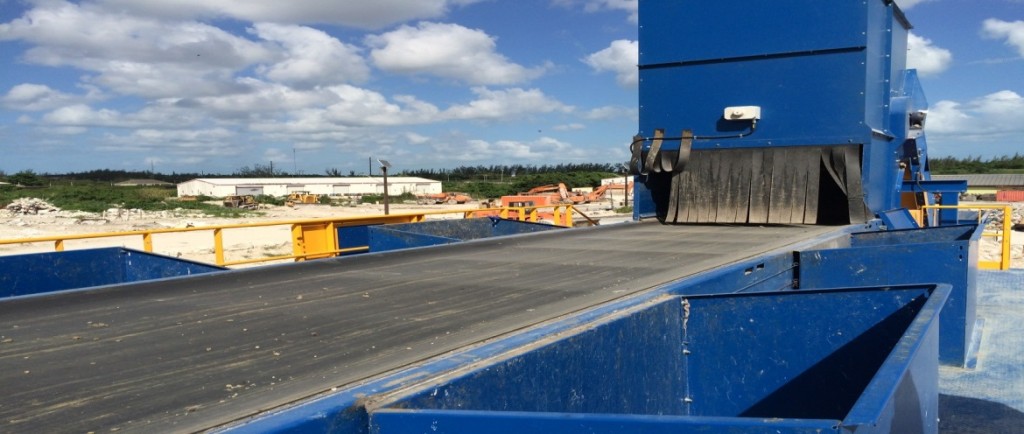
Proper Solid Waste Management Involves all of us
January 8th, 2016
by Syreta Roberts

 Photo by Rosemary Clarice Hanna
Photo by Rosemary Clarice Hanna
The Bahamas markets itself as a Tourist destination: An archipelago of 700 islands and Cays with white sand beaches, aqua transparent water and a green and pristine environment. For the most part, this is the case. However, garbage can easily be found on road sides, and derelict vehicles in some yards, and in the nearby bushes of some areas in New Providence and the Bahamian Family Islands. Plastic containers, styrofoam plates, and cups left on beaches, are a common discovery. What is worst is that all of these items and more, can be found in the sea.
 Photo by Rosemary Clarice Hanna
Photo by Rosemary Clarice Hanna
Moreover, the spontaneous fires at the Harold Road landfill over the last five years made management of solid waste on the island of New Providence impossible. This was unacceptable, for me personally, because the pre-school that my daughter attended would from time to time become engulfed by the thick black smoke and fumes from these fires. At best, these fires would surround the school for a few hours and at worst for two weeks. Despite the school’s efforts to keep the children in-doors or request that they be collected and stay home until the fires were contained, by the time my daughter was 3 years old she had developed asthma.
In May 2014, the Government run Harold Road Landfill came under new management and fortunately, for all of us residing in New Providence, the frequency and intensity of the landfill fires have been reduced tremendously. Renew Bahamas, the company managing the Landfill, aims to reduce the amount of solid waste that ends up in the landfill by recycling plastics, cans, cardboards, metals, paper, and glass that comes in as garbage.
Additionally, Renew Bahamas aims to remediate and reconstruct the landfill, transforming it into a sanitary state, which will reduce and eventually eradicate the spontaneous fires.
This enormous initiative to recycle waste and reform the landfill will require the involvement of all persons residing in The Bahamas in order for it to be sustainable. The process of recycling starts in homes, schools, business places, and similar entities. We have to sort our garbage according to the types of waste items – plastics, cans, bottles, paper & cardboard, metals. There should be specific containers outside of homes and buildings in which to put each type of waste. Specifically labeled garbage containers for each type of commonly used items should be put in public areas. Further, the waste should be collected in this separated manner in order for recycling to be sustainable.
Organic waste such as food should be disposed of separately and collected from schools, hotels, and restaurants to be prepared for composting in order for it to be used by local farms, nurseries, stables, and national agricultural and environmental projects at the Bahamas Agriculture and Marine Sciences Institute (BAMSI).
The development of a culture for proper solid waste management must involve all people residing in The Bahamas. A national communication plan on ways to involve and at the same time educate residents on improving the management of municipal solid waste by sorting garbage in the homes, cleaning up of beaches, paying fees to properly dispose of waste that can pollute the environment and the air would go a long way in gaining Bahamian buy-in on moving away from dumping locations to sanitary landfills. We will understand that garbage left uncollected for weeks will spread diseases, contaminate water, including mangroves, which play an important role in increasing our fisheries. We will understand that our involvement in proper municipal solid waste management is linked to reducing greenhouse emissions that contribute to global warming.
The rewards of such involvement would mean a healthier land and sea environment overall, less breeding grounds for vector-borne diseases, which will all strengthen our Tourism industry. Finally, finding ways to re-use, recycle, and properly reduce solid waste, carbon dioxide and other greenhouse gases would make The Bahamas eligible for Carbon finance benefits.

Photo by Rosemary Clarice Hanna
Tags: Carbon Finance., Garbage Collection, Garbage sorting, greenhouse gases, Municipal Solid Waste (MSW) Management, recycling
The Gleaner reserves the right not to publish comments that may be deemed libelous, derogatory or indecent.
To respond to The Gleaner please use the feedback form.
- Three ways the Caribbean can strengthen financing for private companies
- Learning about Jamaica’s Forests by Hiking the Blue Mountains
- Making People Happy
- US Supreme Court: One Less Known Example of How a Supreme Court Decision, Shapes Up Judiciary Reality in the Caribbean
- Crime in Paradise: Preview of Forthcoming IDB Study on Crime in the Caribbean
- Caribbean Diaspora: How Can They Finance Development in the Region?
- Zika Virus and the Economic and Human Reproductive Health Implications for the Caribbean
- Proper Solid Waste Management Involves all of us
- Victimization surveys: 3 common mistakes to avoid
- Social Innovation: The way forward for Civil Society Organizations






